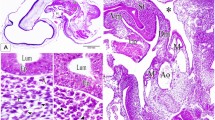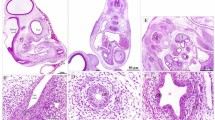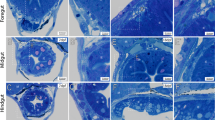Abstract
The small size of insects does not permit the study of their digestive processes by the classical methods of mammalian physiology; the production of fistulæ, the study of changes in blood constituents, and the effects of nervous stimulation, for example, have not been successfully exploited with insects. Advances have, in fact, been almost entirely dependent upon the applications of normal histological techniques, and these are inadequate for many purposes.
This is a preview of subscription content, access via your institution
Access options
Subscribe to this journal
Receive 51 print issues and online access
$199.00 per year
only $3.90 per issue
Buy this article
- Purchase on Springer Link
- Instant access to full article PDF
Prices may be subject to local taxes which are calculated during checkout
Similar content being viewed by others
References
Hodge, C. . Biol. Bull., 72, 203 (1937).
Shinoda, O., Z. Zellforsch., 5, 278 (1927).
Author information
Authors and Affiliations
Rights and permissions
About this article
Cite this article
DAY, M. Midgut Epithelial Regeneration as a Means of Studying Insect Digestion. Nature 164, 878–879 (1949). https://doi.org/10.1038/164878b0
Issue Date:
DOI: https://doi.org/10.1038/164878b0
Comments
By submitting a comment you agree to abide by our Terms and Community Guidelines. If you find something abusive or that does not comply with our terms or guidelines please flag it as inappropriate.



